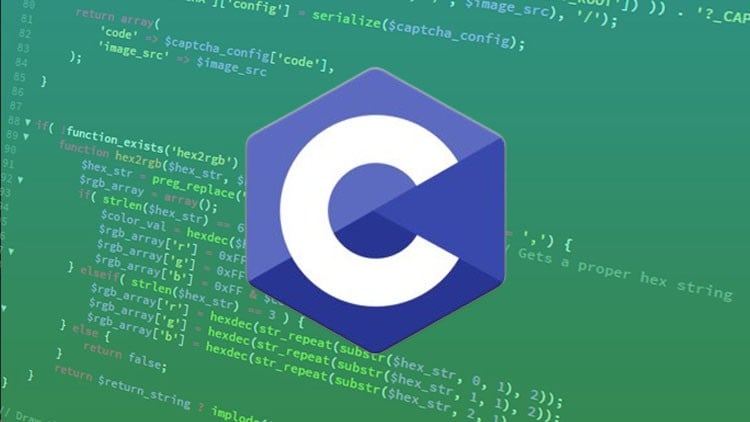
Understand The Basics To Advanced Of C, Including Its Syntax, Data Types, And The Structure Of C Programs.
⏱️ Length: 1.9 total hours
⭐ 4.29/5 rating
👥 27,073 students
🔄 January 2024 update
Add-On Information:
Note➛ Make sure your 𝐔𝐝𝐞𝐦𝐲 cart has only this course you're going to enroll it now, Remove all other courses from the 𝐔𝐝𝐞𝐦𝐲 cart before Enrolling!
- Course Overview:
- This concise course, ‘The Complete C Programming Course for Basic to Expert’, serves as an essential gateway into C programming. Despite its 1.9-hour duration, it efficiently guides learners from their first line of code to a confident understanding of C’s core principles. You will appreciate C’s pivotal role in system programming, operating systems, and high-performance computing, understanding its enduring relevance. This course establishes a solid foundation, making the transition to more complex programming concepts or other languages smoother. It’s structured for maximum learning efficiency, ensuring you grasp fundamental syntax and program architecture effectively.
- Requirements / Prerequisites:
- No prior programming experience is required; this course caters to absolute beginners.
- Basic computer literacy, such as file management, is beneficial.
- Access to a computer (Windows, macOS, or Linux) with a stable internet connection for course access and compiler setup is essential.
- A willingness to actively engage and practice coding exercises is paramount.
- Having a text editor or simple IDE with a C compiler (e.g., GCC) is recommended for immediate hands-on practice.
- Skills Covered / Tools Used:
- Core Language Constructs: Master C’s fundamental building blocks: variables, constants, data types, and operators. Implement control flow: conditional statements (
if-else,switch-case) and looping constructs (for,while,do-while) for program logic. - Function Development: Learn functions for modularizing code, enhancing reusability and readability. Understand defining, declaring, calling, passing arguments, return types, and leveraging standard library functions.
- Pointers and Memory Management: Unlock C’s power in low-level memory manipulation through pointers—declare, assign, dereference, and perform arithmetic. Explore dynamic memory allocation using
malloc()andfree()for flexible data structures. - Input/Output Operations: Interact with user and system using standard I/O (
printf()for formatted output,scanf()for user input). Explore character-based I/O (getchar(),putchar()) and basic file handling. - Preprocessor Directives: Understand the C preprocessor and directives like
#includefor header files and#definefor macros, crucial for code organization and conditional compilation. - Modular Programming and Linkers: Organize C projects into multiple source and header files, understanding the compilation and linking process to form a complete executable.
- Debugging Strategies: Develop initial strategies for tracing logical errors beyond compiler messages. Systematically approach problem-solving and isolate runtime issues.
- Tools Used: Primary tools include a C Compiler (e.g., GCC, Clang) and a Text Editor or IDE (e.g., VS Code with C/C++ extensions, Code::Blocks) for efficient code writing and management.
- Core Language Constructs: Master C’s fundamental building blocks: variables, constants, data types, and operators. Implement control flow: conditional statements (
- Benefits / Outcomes:
- Develop strong algorithmic thinking and problem-solving skills, transferable to any programming field.
- Gain the ability to write efficient, low-level code, understanding how computer hardware and software interact.
- Acquire fundamental knowledge to transition into advanced programming topics like operating systems, game development, or embedded systems.
- Build small, functional console-based applications, solidifying understanding through practical implementation.
- Enhance career prospects by adding a highly valued skill, particularly for roles requiring systems-level programming or deep technical understanding.
- Cultivate an appreciation for memory optimization and resource management, crucial for robust and scalable software.
- PROS:
- Excellent Starting Point: Highly accessible for beginners, covering foundational concepts for a strong understanding of C from scratch.
- Time-Efficient Learning: Its concise 1.9-hour duration is ideal for a quick, comprehensive introduction or rapid refresher on C essentials.
- Practical and Direct: Focuses on practical application with hands-on examples reinforcing theoretical concepts, making learning engaging and effective.
- Modern and Relevant: Updated in January 2024, ensuring content is current with modern C standards and compiler practices.
- Popular Choice: With over 27,000 students, its popularity suggests broad appeal and a well-received teaching approach.
- Foundational Skill Development: Establishes critical logical thinking and low-level programming skills invaluable for understanding software-hardware interaction.
- CONS:
- Limited Depth for “Expert” Claim: While excellent for basics, the 1.9-hour duration inherently limits the depth to which truly “expert” level C programming topics (e.g., advanced data structures, complex algorithms, multi-threading, intricate memory models, or large-scale project architecture) can be covered, potentially overstating the “expert” aspect of the course title.
Learning Tracks: English,Development,Programming Languages
Found It Free? Share It Fast!